The development sent shares of Vodafone Idea soaring 17 per cent in Friday’s trade, with analysts broadly expecting the step to settle down some long-standing imbroglio and international litigations with Cairn Energy and Vodafone UK — not to mention a payout of about Rs 8,100 crore by the government.
“In all, it signals India’s more supportive and consistent approach to investments and taxation,” Edelweiss Securities said in a note.
The brokerage also sees the move as a positive for the India investment paradigm, given that investments here have eventually gotten legal protection, and the government approach is more supportive and, in some cases, reconciliatory.
“On the regulatory front, over the last month, India has substantially widened further the gap with its key EM FDI/flows competitor, China. So should the Indian market be valued even further up? Indeed, but we do believe with India trading at over 21 times forward PE, well above long-term average, earnings and investment momentum are largely built in. We retain the June 2022 Nifty50 target of 16,100,” Edelweiss said.
G Chokkalingam, Founder at Equinomics Research & Advisory, said the move would surely benefit India and boost medium to long-term foreign direct inflows, as it would improve the business climate, even as it may or may not add much to Nifty50 targets in the near future.
“Despite the pandemic impact and worldwide negative flows in 2020, India had received robust FPI inflows. With the kind of changing political scenario at global level, liberalisation of policies in India will surely increase significantly going ahead,” Chokkalingam said.
Union Revenue Secretary Tarun Bajaj said India was receiving a lot of FPI flows of late in spite of Covid-related disruptions.
“When I met foreign investors, they said this was something that actually was concerning to them. This decision does help us to actually clarify our position to the investor community that we are not into any retrospective legislation. The money part is not important for a sovereign. A sovereign that has a budget of more than Rs 30 lakh crore, an amount of Rs 5,000 or Rs 10,000 crore is not that important. What is important is your commitment, your words, and your legislation. We will not go back on the legislation. We will give that confidence to the investor community,” Bajaj told ET NOW.
Edelweiss said Cairn is a direct beneficiary to the tune of Rs 7,900 crore, Vodafone UK would likely to see a contingent liability removed, and Vedanta extinguishing a contingent liability of Rs 4,300 crore.
“It is a positive development in itself, clears some decks for divestments (Air India), and comes on the back of tailwinds: corporate tax cuts, and wooing of investments and business. Even so, while taxes are simplified, India’s tax authorities have tended to be a bit aggressive in their tax collections efforts. Is this a policy reversal that ushers in a change in ‘on the ground’ approach? Too early to make that call, but it could well be a leader, which should be tracked,” Edelweiss said.
Pranay Bhatia, Partner & Leader – Tax and Regulatory Services at BDO India, said even as India has moved from a high tax country to a more mature and moderate tax regime, its retroactive taxes did not represent a progressive tax environment.
“In such a situation, the decision to withdraw retroactive indirect transfer tax would certainly demonstrate a more predictable tax environment; coupled with the natural advantage that India offers in the global supply chain rejig, India would definitely be a more attractive investment jurisdiction,” he said.



